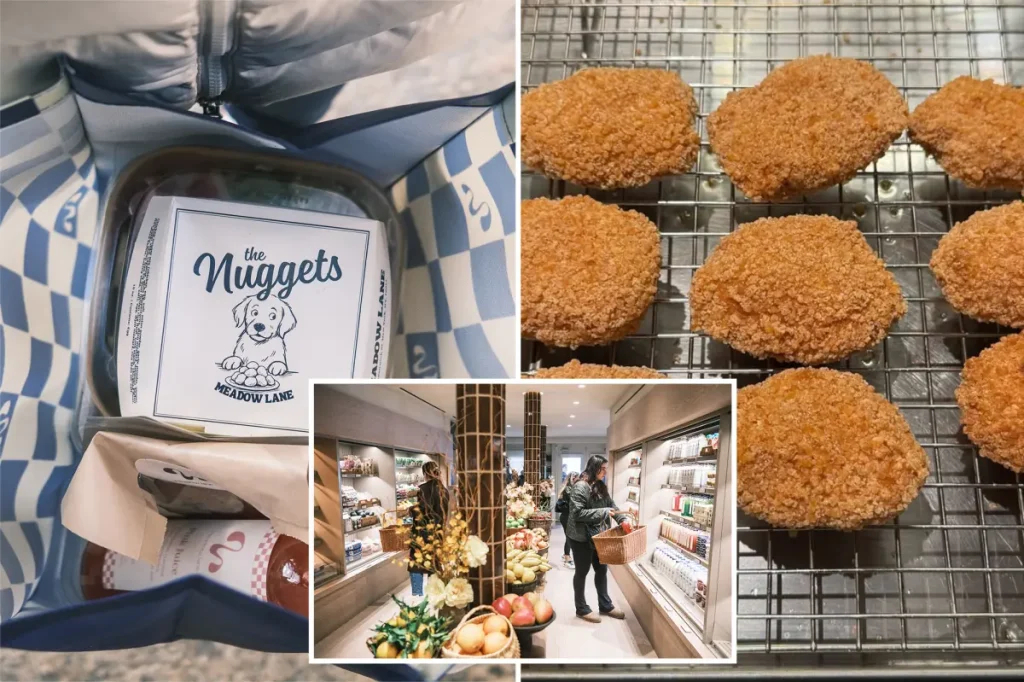The Meadow Lane Phenomenon: Luxury Groceries Amid Economic Divides
In the heart of Tribeca, Manhattan, a new high-end grocery store called Meadow Lane has created quite a stir since its grand opening last Friday. Founded by 28-year-old Sammy Nussdorf, known online as “Brokeback Contessa,” the store has become both a sensation and a lightning rod for criticism in New York City’s complex socioeconomic landscape. Despite facing death threats over its eye-watering prices—which include $625 tins of Siberian caviar, $65 bottles of olive oil, and $15 half-dozen gluten-free chicken nuggets—Meadow Lane has been so overwhelmed with customers that it temporarily closed its doors this week after being stripped bare by eager shoppers. “We can’t keep up,” Nussdorf admitted. “We outperformed all of our projections.” This unexpected consumer frenzy has forced the store to implement purchase limits while scrambling to restock its luxurious offerings, creating a fascinating case study in contemporary urban retail dynamics where scarcity seems to fuel desire.
The controversy surrounding Meadow Lane reveals deeper tensions in New York City. Named after a Hamptons street lined with billionaires’ beach estates, the store opened during a particularly sensitive time when SNAP benefits for struggling New Yorkers faced uncertainty during the government shutdown. This timing, combined with the store’s unabashed luxury positioning, sparked intense backlash. “I have death threats. People are threatening to burn down the store and throw rocks through the windows. The hate is out of control,” said Nussdorf, whose parents previously made Forbes’ list of America’s richest families. The young entrepreneur expresses surprise at the vitriol, stating, “They value the narrative they set over the truth. It opened my eyes to a part of humanity that I never knew existed.” This reaction comes as socialist Mayor-elect Zohran Mamdani has increasingly centered his rhetoric around economic inequality, creating a charged atmosphere for businesses that cater exclusively to the wealthy.
Ironically, the controversy has only fueled Meadow Lane’s popularity. Long lines snake around the block daily, and Nussdorf claims to have gained over 100,000 followers on social media because of the attention. “All it is doing is increasing my engagement and making this more relevant,” he noted about the criticism. “That’s the antithesis of what they want, but it is what’s happening.” Among the shop’s new devotees is “Shark Tank” investor Barbara Corcoran, who was spotted purchasing the store’s celebrated chicken nuggets. These nuggets, despite their $15 price tag for just six pieces, have become one of Meadow Lane’s most sought-after items, described as “crispy and delicious” by those willing to pay the premium. Other customer favorites include a $20 Chinese chicken salad packed with tangy dressing and vegetables that provide what customers describe as a “mysteriously satisfying crunch,” horseradish leek chicken salad, a miso salmon bowl, cacio e pepe mac and cheese, and “grandma’s meatballs.”
The unexpected demand has forced Meadow Lane to adjust its operations significantly just days after opening. The store now limits customers to five prepared food items per person and has shortened its hours, typically closing around 4 p.m. when most goods have sold out—far earlier than its intended 9 p.m. closing time. “People were waiting in the store for new batches to be made and it was too crowded and then we couldn’t prepare other things,” Nussdorf explained. By Monday, just three days after opening, the store had to completely close to reassess and restock its inventory. When fully operational, Nussdorf plans for the store to open at 7 a.m. and close at 9 p.m., offering an expanded menu as new cooking equipment arrives. Even the store’s checkered blue and beige reusable tote bag, reminiscent of a Louis Vuitton pattern, has become a coveted accessory, reflecting how the store’s aesthetic appeal extends beyond its food offerings.
The Meadow Lane phenomenon represents a microcosm of larger economic and social tensions playing out in cities across America. While some New Yorkers and tourists alike eagerly line up for luxury grocery items during an inflation crisis, others see the store as emblematic of growing inequality. Kate Friedman, a 24-year-old visitor from Chicago, waited in line Tuesday morning specifically to try the gluten-free chicken nuggets and matcha after following Nussdorf on TikTok. Meanwhile, the store’s striking interiors, designed by Sarah Carpenter with carved nooks for shopping baskets, create an experience that feels more like luxury retail than traditional grocery shopping. Despite the controversy, or perhaps because of it, Meadow Lane has tapped into a genuine market demand. “People are lining up. There is a market for this,” Nussdorf acknowledged, before adding, “That doesn’t mean other people aren’t suffering.” His statement encapsulates the uncomfortable reality that even as some New Yorkers struggle with food insecurity, others are willing to spend small fortunes on premium groceries, highlighting the stark economic divides that characterize modern urban life.
Despite catering to a wealthy clientele, Nussdorf insists that his vision for Meadow Lane extends beyond attracting social media influencers and tourists. “The locals are the ones who keep local businesses afloat,” he emphasized, expressing a desire to become a neighborhood staple rather than just a viral sensation. This aspiration speaks to the complicated relationship between exclusivity and community in urban retail—can a store with $625 caviar truly become a beloved local institution? As Meadow Lane continues to navigate its unexpected success and controversy, it stands as a compelling example of how luxury retail operations function in an increasingly polarized economic environment. Whether the store represents a fleeting trend or the beginning of a new chapter in upscale urban groceries remains to be seen, but one thing is clear: in New York City’s complex retail ecosystem, sometimes the most controversial ventures become the most successful, regardless of—or perhaps because of—the outrage they inspire.


